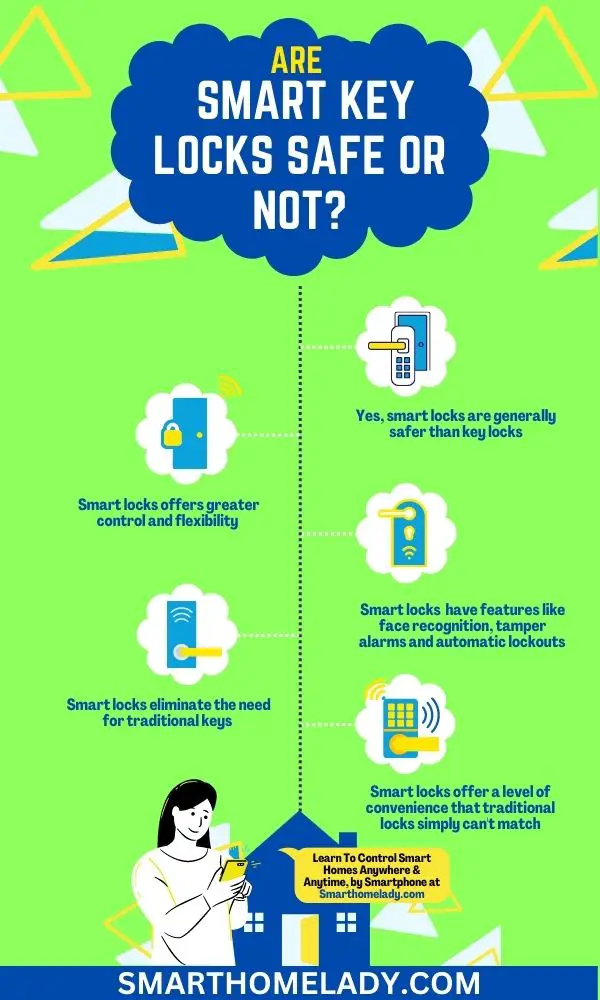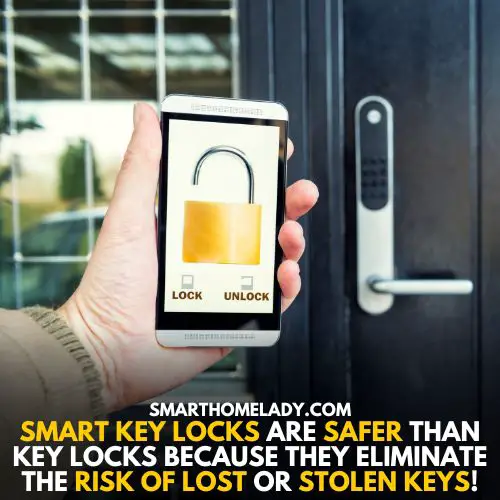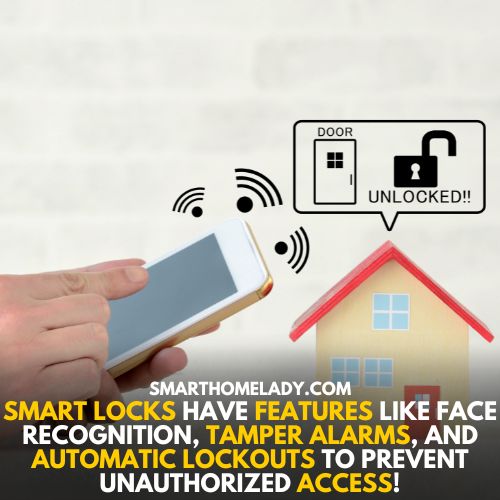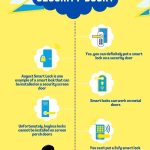Regarding home security, one of the first things that comes to mind is locks. Locks are essential in keeping our homes and valuables safe from intruders. However, traditional key locks can be easily picked, lost, or duplicated.
This has led many homeowners to turn towards smart key locks as a more secure alternative. But are smart key locks safer than their traditional counterparts?
As a smart homeowner, I have analyzed various studies on the safety of these locks and want to share my findings with you.
In this article, we will delve into the safety concerns surrounding smart key locks and explore whether they are truly hack-proof or not. We will also compare them with traditional locks. So lock your doors (or don’t) and let’s get started.

Contents
- 1 Are smart locks safer than key locks – Unlocking the Mystery
- 2 How Safe Are Smart Locks – A Critical Look At Their Features
- 3 Are Smart Locks Hackable? Unlocking The Truth
- 4 Smart Lock Vs Traditional Lock – The Battle Of Security
- 5 Smart Locks Pros & Cons – are Smart Locks Worth The Hype?
- 6 How To Keep Your Smart Door Locks Safe – Securing The Gateway
- 7 Are digital locks safer than key locks?
- 8 Can smart locks be hacked?
- 9 Are smart locks easier to break into?
- 10 Can you trust smart locks?
- 11 Conclusion
Are smart locks safer than key locks – Unlocking the Mystery
The short answer is yes; smart locks are generally safer than key locks. Let’s explore why.
First and foremost, smart locks eliminate the need for physical keys. This means that you don’t have to worry about losing your keys or someone stealing them.
Instead, you use a smartphone app or a keypad to unlock the door. This reduces the risk of someone gaining unauthorized access to your home or office.
Another advantage of smart locks is that they offer greater control and flexibility. With a smart lock, you can easily set up temporary access codes for guests or service providers.
You can also monitor who comes and goes from your property by checking the lock’s activity log. This gives you greater peace of mind and ensures you always know who has access to your property.
Smart locks also come with advanced security features that make them harder to hack or bypass.
For example, some models use biometric authentication, such as fingerprint scanning, to ensure only authorized users can unlock the door.
Others use advanced encryption algorithms to prevent hackers from intercepting and decoding the lock’s wireless signals.
So, smart locks are safer than key locks because they eliminate the risk of lost or stolen keys, offer greater control and flexibility, and come with advanced security features.
While no lock is completely foolproof, a smart lock can significantly reduce the risk of unauthorized access and provide greater peace of mind.

How Safe Are Smart Locks – A Critical Look At Their Features
I think smart locks are a great addition to any home security system. They offer convenience and peace of mind, but the question remains – how safe are they really?
There is no denying that smart locks are vulnerable to hacking like any other electronic device.
However, most reputable brands have taken steps to address these concerns by implementing advanced encryption and security measures.
Traditional locks can also be easily picked or broken into with the right tools and knowledge. Smart locks, on the other hand, often come equipped with added features like face recognition, tamper alarms, and automatic lockouts to prevent unauthorized access.
Additionally, smart locks offer a level of convenience that traditional locks simply can’t match.
With remote access and control through a smartphone app, you can easily grant access to family members or service providers without having to be physically present.

So, while there is no foolproof security system, smart locks offer a level of convenience and added security that traditional locks can’t match. Smart locks can be a safe and worthwhile investment for homeowners with the right precautions and proper setup.
Are Smart Locks Hackable? Unlocking The Truth
Yes, smart locks can be hacked. Don’t underestimate the potential risks. Smart lock vulnerabilities exist as with any technology that relies on connectivity and digital interfaces.
Cybersecurity concerns are a reality for all internet-connected devices, and smart locks are no exception. Hacking smart locks is a real threat that should not be ignored.
To better understand the security risks associated with smart locks, we can look at some common methods of attack used by hackers.
- Digital lock picking is one method where attackers use software to brute force their way into a lock’s code or exploit weaknesses in the system’s design.
- Remote access vulnerabilities are also a concern, as hackers may try to gain control of the lock through its app or other wireless connections.
It is important to take steps to protect your smart locks from these types of attacks.
- One way to do this is by choosing a reputable brand with strong encryption and authentication protocols.
- Regularly updating firmware and keeping up-to-date with cybersecurity news and best practices can also help protect against potential threats.
With proper precautions, you can enjoy the convenience of smart locks without compromising your home’s security.
| Potential Smart Lock Vulnerabilities | Protective Measures |
|---|---|
| Weak Passwords | Use strong passwords or passphrases |
| Outdated Firmware | Regularly update firmware |
| Unsecured Wireless Connections | Ensure a secure Wi-Fi network |
| Lack of Encryption | Choose brands with strong encryption protocols |
| App Vulnerabilities | Keep apps up-to-date & avoid using public networks |
Smart Lock Vs Traditional Lock – The Battle Of Security
Smart locks are advanced locking systems that can be controlled remotely through a smartphone or web application. These locks use wireless technologies such as Bluetooth, Wi-Fi, or Z-Wave to communicate with the user’s smartphone or other smart devices.
Smart locks can be programmed to allow specific individuals to access the lock at specific times, and they can also be integrated with other smart home devices, such as cameras and sensors, for enhanced security.
Smart locks eliminate the need for traditional keys and provide a more convenient and secure way of locking and unlocking doors.
On the other hand, traditional locks are the conventional locking mechanisms that use keys to lock and unlock doors. These locks do not have any digital or wireless capabilities and require direct physical access to the lock to operate.
| Features | Smart Locks | Traditional Locks |
|---|---|---|
| Remote Control | Yes | No |
| Wireless Connectivity | Yes | No |
| Access Management | Yes | No |
| Keyless Entry | Yes | No |
| Integration with other smart devices | Yes | No |
| Temporary access codes | Yes | No |
| Compatibility with traditional keys | Yes | Yes |
| Price | High | Low |
| Installation | Easy | Easy |
| Security | High | High |
Traditional locks are widely used and considered to be reliable and secure, but they have limitations in terms of convenience and accessibility.
Unlike smart locks, traditional locks cannot be remotely controlled or monitored, and they do not provide features such as keyless entry or temporary access codes.
Smart Locks Pros & Cons – are Smart Locks Worth The Hype?
| Pros | Cons |
|---|---|
| The convenience of remote access | Compatibility issues |
| Ability to grant access to visitors or contractors | User error risks |
| Monitoring who comes in and out of your home | Battery life |
| Easy installation for some models | Professional help is needed for other models |
| Integration with home automation systems | Security concerns and hacking risks |
| No need for physical keys | Potential for malfunctions or technical glitches |
| Ability to track access history | Higher cost compared to traditional locks |
Note: The above pros and cons are not exhaustive and may vary depending on the specific model and brand of smart lock. It’s important to thoroughly research and compare different options before making a purchase decision.
How To Keep Your Smart Door Locks Safe – Securing The Gateway
To ensure the security of your home, it’s important to establish a routine for checking and maintaining your smart door lock. Here are three things you can do to keep your smart door locks safe:
- Password Protection – Always use strong passwords and avoid using common phrases or words that might be easy to guess. Consider enabling two-factor authentication for an added layer of security.
- Remote Access Security – If you plan on accessing your smart lock remotely, make sure you use a virtual private network (VPN) for secure access. This will prevent unauthorized users from intercepting sensitive data.
- Physical Backup Keys – It’s always good practice to have physical backup keys if something goes wrong with your smart lock system. Keep them in a safe place where only trusted individuals can access them.
By incorporating these tips, you can help ensure the safety and security of your home while enjoying the convenience of biometric authentication and smart home integration offered by modern smart locks technology.
Remember – Staying cautious is key when it comes to protecting yourself against potential risks associated with technology advancements!
Frequently Asked Questions FAQs
Are digital locks safer than key locks?
Yes, digital locks are generally considered safer than traditional key locks because they offer more advanced security features.
Many digital locks come equipped with advanced encryption protocols, making it difficult for hackers to bypass the system.
Some digital locks even have tamper-proof mechanisms that alert the owner if someone attempts to tamper with the lock.
In my personal experience, I have found digital locks to be much safer than traditional key locks. The lock requires a unique code to be entered, which only my family members and trusted friends have access to.
I also appreciate the fact that I can change the code regularly, which adds an extra layer of security.
Can smart locks be hacked?
Yes, like any digital device, smart locks can be hacked if they are not properly secured. However, most smart locks come equipped with advanced security features that make it difficult for hackers to gain access.
For example, many smart locks use encryption protocols that prevent hackers from intercepting the lock’s signals.
Are smart locks easier to break into?
No, smart locks are not necessarily easier to break into than traditional locks. In fact, many smart locks offer advanced security features that make them more difficult to bypass than traditional locks.
However, it is important to note that no lock is completely foolproof, and it is always possible for a determined intruder to find a way to bypass the system.
Can you trust smart locks?
Smart locks can be trusted if they are properly installed, maintained, and used according to the manufacturer’s instructions.
Choosing a reputable brand is essential, as ensuring that the lock has been tested and certified for security features.
It is important to note that no technology is 100% secure, and there is always a risk of hacking or malfunction. Therefore, it is always advisable to have a backup key or manual override option in case of emergencies.
Conclusion
In conclusion, smart locks offer convenience and ease of access, but they come with their own set of risks. As with any technology that connects to the internet, hacking or cyberattacks is always possible.
However, you can mitigate these risks by following best practices for securing your Wi-Fi network and choosing a reputable brand with strong encryption protocols.
It’s also important to remember that no lock is foolproof. There’s always a chance of physical break-ins or thefts. Therefore, it’s crucial to have additional layers of security, such as surveillance cameras and alarm systems, in place.
Ultimately, the decision on whether to use a traditional key lock or a smart lock should be based on your individual needs and preferences. It’s up to us as consumers to weigh the pros and cons carefully before making this important choice for our home security.
Scholarly Sources
- Wei, S. (2020, August). Research and Application of Smart Lock Safety Management and Control System. In Journal of Physics: Conference Series (Vol. 1601, No. 5, p. 052038). IOP Publishing.
- Shanthini, M., & Vidya, G. (2021). An ioT-based smart door lock with sanitizing system. In Inventive Computation and Information Technologies: Proceedings of ICICIT 2020 (pp. 63-79). Springer Singapore.
- Mathew, M., & Divya, R. S. (2017, July). Super secure door lock system for critical zones. In 2017 International Conference on Networks & Advances in Computational Technologies (NetACT) (pp. 242-245). IEEE.
- Yedulapuram, S., Arabelli, R., Mahender, K., & Sidhardha, C. (2020, December). Automatic Door Lock System by Face Recognition. In IOP Conference Series: Materials Science and Engineering (Vol. 981, No. 3, p. 032036). IOP Publishing.


